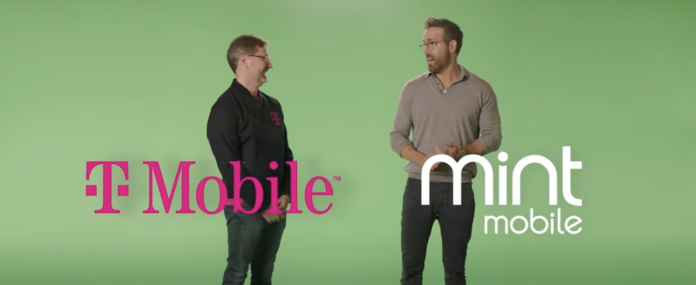T-Mo makes ‘commitmint’ to continue $15 per month service option
T-Mobile US has officially taken ownership of value-focused mobile virtual network operator brands Mint Mobile and Ultra Mobile as well as wholesale provider Plum—all of which it acquired through its purchase of the brands’ parent company, Ka’ena Corporation.
The Mint Mobile MVNO operates on T-Mobile US’ network. T-Mo agreed to the purchase of Ka’ena for up to $1.35 billion in combined cast and stock in March of 2023.
In announcing the close of the deal, T-Mo said that the acquisition will enable Mint and Ultra (which focuses on international mobile service) to serve even more customers, and that T-Mobile will “tap into the unique capabilities that have fueled their success in wireless, particularly Mint’s best-in-class approach to D2C marketing that customers love.”
Mint made a name for itself with cheeky, low-budget ads featuring actor and producer Ryan Reynolds (also a part-owner in Mint) and its $15 per month service offering. T-Mo said that it is making a “commitmint that Mint Mobile will continue to have a $15/month plan available for new and existing customers.” It is also making an offer to new customers of three months of Unlimited Premium Wireless service for $45, after which time the promotional pricing reverts to regular pricing. As part of T-Mobile Mint users will also soon be able to have scam call screening, free roaming in Canada (a nice touch, since it’s where Reynolds is from) and a new data roaming option for Ultra Mobile customers visiting Mexico.
“This combination is a win-win all around – a perfect pairing of highly complementary brands coming together on our industry-best 5G network to continue shaking things up for the benefit of customers,” said Mike Katz, president of marketing, strategy and products at T-Mobile US. “We are excited to maintain the unique style and entrepreneurial spirit that make Mint and Ultra truly special, while also finding ways to supercharge their growth and leverage some of the secrets of that success into other areas of our business.”
The closing of the acquisition comes just as the federal Affordable Connectivity Program (ACP), which provided subsidies for monthly service plans for home and mobile connectivity, ends due to lack of continued funding. When enrollment in the program was frozen in February 2024, it was serving nearly 23.3 million households across the United States. Analysts have been paying close attention to the impact that potentially losing a large percentage of those customers could have on service providers. During its first quarter earnings call last week, T-Mo’s Katz said: “We think wireless is a not a category that customers are going to walk away from. So these customers need another alternative and we’re working closely with … partners and with the customers to find them another alternative. He went on to say that with Mint, T-Mobile US will have another option in the market to offer, including to customers who “may feel stranded from competitors.”
Mint founders David Glickman and Rizwan Kassim are among the leadership team from Ka’ena who are joining T-Mobile. The national carrier said that “the brands will continue to operate autonomously but closely aligned to the broader T-Mobile brand and business, similar to T-Mobile’s successful acquisition of MetroPCS in 2013.” Reynolds will continue in his role as well. Reynolds said in a statement: “We’ve been able to rapidly grow this brand by putting customers and value first while being unafraid to act quickly and take chances. T-Mobile is the best partner to help us supercharge Mint and we’re grateful for their partnership.”
Glickman said that the completion of the acquisition “sets the stage for even more customer-wins as we continue to innovate and leverage the largest and fastest 5G network.”

